Buildings 2.0
Buildings 2.0 dives deep into the technology, trends and talent reshaping the structures where we live and work. Hosted by Jose Cruz Jr, this podcast brings you interviews with the industry’s brightest minds, from visionary architects and property owners to chief innovation officers. Brought to you by Integrated-Projects.com.
Episodes
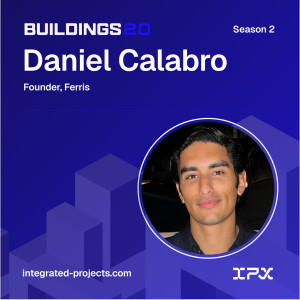
Wednesday Jul 02, 2025
Wednesday Jul 02, 2025
This conversation explores the intersection of law and engineering, particularly focusing on the accessibility of building codes and the implications of AI in civil engineering. Daniel Calabro, founder of Ferris shares his personal journey from engineer to entrepreneur, discussing the challenges and opportunities presented by AI technologies. Key themes include the importance of trust and education in adopting AI, the talent shortage in the engineering field, and the vision for Ferris as a central hub for engineering tools and data. The discussion also touches on the legal precedents surrounding public access to codes and the potential for innovation in the industry.
Takeaways
Code should be publicly accessible if it's law.
AI can enhance engineering workflows but can't replace human judgment.
Building personal relationships in engineering improves project outcomes.
The engineering industry faces a talent shortage due to risk and pay issues.
AI can help bridge knowledge gaps in engineering teams.
Trust and education are crucial for AI adoption in engineering.
Public access to building codes can drive innovation.
Ferris aims to centralize engineering tools and data.
The future of civil engineering involves integrating AI into daily workflows.
Engineers need to adapt to new technologies to remain relevant.
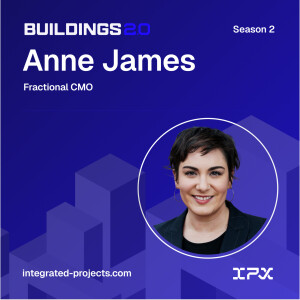
Tuesday Jun 24, 2025
Tuesday Jun 24, 2025
In this episode, Anne James shares her journey from founding a magazine to becoming a fractional CMO for tech startups. She discusses the importance of persistence in marketing, the unique challenges of the AEC industry, and the evolving role of AI in marketing strategies. Anne emphasizes the need for marketers to find their voice and adapt to new platforms while maintaining authenticity. She also highlights the significance of community building and the role of founders in shaping brand narratives.
Key Takeaways
Anne's journey into marketing was unconventional, starting from a passion for art and writing.
Building a brand requires persistence and creativity, especially in the early stages.
The transition from running a magazine to working with tech startups involved adapting to team dynamics.
Understanding the target audience is crucial for effective marketing in the AEC industry.
B2B and B2C marketing strategies differ significantly in approach and execution.
Creating awareness for startups involves providing valuable content and solutions to potential clients.
Finding a brand's voice is essential for authentic communication with the audience.
AI tools can enhance marketing efforts but should be used thoughtfully to maintain authenticity.
Founders need to engage with their audience and share their vision to build a strong brand.
The marketing landscape is evolving, offering new opportunities for marketers to establish their presence.
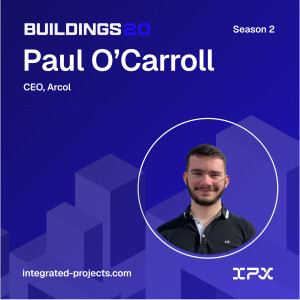
Friday May 30, 2025
Friday May 30, 2025
In this conversation, Paul O'Carroll, founder and CEO of Arcol shares his journey from childhood experiences in architecture to founding a collaborative BIM platform. He discusses the challenges of transitioning from traditional design methods to innovative, browser-based solutions, emphasizing the importance of collaboration in the architecture industry. Paul reflects on the technical and product challenges faced while building Arcol, the pressures of venture capital, and the long-term vision for the company. In this conversation, Paul discusses the complexities of product development in the architecture and design industry, emphasizing the challenges of collaboration and the need for innovative authoring tools. He shares insights on scaling leadership and team dynamics as the company grows, and highlights the upcoming launch of Arcol along with the Retooling AEC event aimed at fostering industry conversations.
Takeaways
Paul's early experiences with his father's architecture work shaped his passion for design.He transitioned from architecture to game development due to a desire for creativity and technical challenges.
The idea of collaborative tools in architecture was inspired by frustrations with existing authoring platforms.
Paul's journey led to the founding of Arcoll, aiming to revolutionize collaborative design.
Venture capital pressures can conflict with the long-term vision of building a generational company.
Real-time collaboration in design tools is a complex challenge that requires careful consideration.
Building a successful product involves navigating an 'idea maze' of trial and error.
The importance of hiring a world-class team to tackle technical challenges in product development.
Paul emphasizes the need for a clear understanding of the product's value proposition.
The journey of Arcol is still ongoing, with a focus on launching innovative solutions. Building a product with a wide surface area is challenging.
The market for collaborative tools is larger than it seems.
Starting with architects as primary users is a strategic choice.
Monetizing collaborators is a complex but necessary goal.
The future of design involves collaboration with agents, not just people.
Scaling leadership requires finding the right team members.
Effective communication is key to scaling a company.
Osmosis and personal interaction are vital in small teams.
The launch of Arcol aims to redefine the authoring process.
Retooling AEC is about fostering industry-wide conversations.
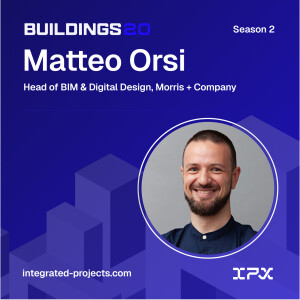
Friday May 09, 2025
Friday May 09, 2025
In this episode, Jose Cruz speaks with Matteo Orsi, Head of BIM at Morris + Company about his journey from Italy to leading a BIM team in the UK. They discuss the emotional connection to architecture, the impact of heritage on modern design, and the importance of embracing technology like BIM in the construction industry. Matteo emphasizes the need for data-driven design and the importance of early engagement in projects to ensure success. The conversation also touches on the evolving role of young architects and the future of architecture in a complex world.
Takeaways
Matteo's journey into architecture was influenced by his family's background in construction.There is a deep emotional connection to buildings that goes beyond mere functionality.Heritage can be both a burden and a source of inspiration for architects.BIM is a modern tool that should be embraced by architects as a natural evolution of the profession.The construction industry has historically been a place of innovation, and it should continue to be.Data-driven design is crucial for making informed decisions in architecture.Engaging clients early in the design process leads to better project outcomes.Young architects should balance technology with a strong understanding of construction methods.The future of architecture will focus on sustainability and the impact of buildings on the planet.Collaboration and knowledge sharing are essential for the growth of the architecture profession.
#bim #heritage #sustainability
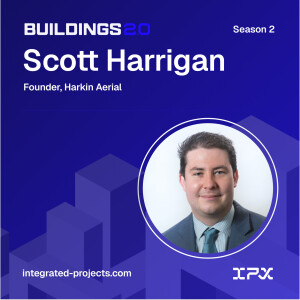
Monday Apr 21, 2025
Monday Apr 21, 2025
In this episode, Jose Cruz speaks with Scott Harrigan about the evolving role of drones in construction and surveying. They discuss common misconceptions about drone technology, its applications in various fields, and the significant advancements in camera technology that enhance data capture. Scott explains the efficiency and accuracy of drone surveys, the return on investment for using drones, and the types of outputs that can be generated. The conversation also touches on budgeting for drone services, the increasing acceptance of drones in government projects, and the regulatory landscape surrounding drone operations. In this conversation, Scott Harrigan from Harkin Aerial discusses the evolving landscape of drone technology, focusing on regulatory challenges, the potential for drones to replace scaffolding in inspections, and the future of drone delivery. He shares his personal journey from an MEP engineer to a drone entrepreneur, emphasizing the importance of industry knowledge and experience for aspiring drone professionals. The discussion also touches on the impact of AI on drone operations and data processing.
Takeaways
Drones are now essential tools in construction projects.
Misconceptions about drones often stem from outdated views.
Drones can cover large areas quickly, improving efficiency.
Accuracy of drone surveys can be within an inch.
Facade inspections benefit greatly from drone technology.
Drones can produce high-resolution 3D models.
Budgeting for drone services can be based on acreage or square footage.
Government agencies are increasingly using drones for asset documentation.
Drone operations are highly regulated by the FAA.
Licensing is required to operate drones commercially. Drones are subject to regulatory hurdles, but recent changes have made permitting easier.
Drones can potentially replace scaffolding for visual inspections, reducing urban clutter.
Drone delivery is likely to be niche rather than widespread in urban areas.
Experience in related industries is crucial for success in drone operations.
AI is beginning to play a significant role in data processing for drone technology.
Drones are best utilized in conjunction with other technologies for efficiency.
The future of drone delivery may focus on remote areas rather than urban centers.
Safety regulations are paramount in drone operations to protect the public.
Drones can provide valuable data for architects and engineers during projects.
The integration of drones into existing workflows can enhance project efficiency.
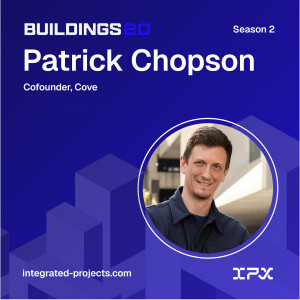
Sunday Apr 13, 2025
Sunday Apr 13, 2025
In this episode, Jose Cruz speaks with Patrick Chopson, co-founder and chief product officer at Cove, about the transformative role of AI in architectural design. They discuss the shift from traditional architectural services to AI-powered solutions, the importance of design excellence, and the evolving business models in the architecture industry. Patrick shares insights on hiring top talent, the challenges of innovation in established firms, and the future implications of AI in architecture. He emphasizes the need for architects to engage with new technologies and adapt to the changing landscape while maintaining a focus on design quality.
Takeaways
Cove has transitioned to AI-powered architectural services.
AI can enhance collaboration in the design process.
On-time delivery is a significant concern for architects today.
Design revisions can be costly, impacting profitability.
AI tools can streamline feasibility studies and design processes.
Hiring top talent is crucial for maintaining design excellence.
Innovation in architecture is often hindered by traditional firm structures.
AI will play a pivotal role in the future of architectural design.
New architects should embrace AI tools and technology.
The core principles of design excellence will remain unchanged.
#aiarchitecture #cove
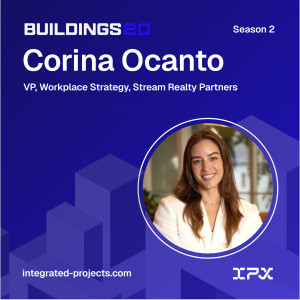
Saturday Apr 12, 2025
Saturday Apr 12, 2025
In this episode of Buildings 2.0, Jose Cruz speaks with Corina Ocanto, Vice President of Workplace Strategy at Stream Realty Partners. They explore the evolution of workplace strategy, the importance of culture, the challenges of remote and hybrid work, and the impact of technology on workplace dynamics. Corina shares insights on how to create effective office spaces that foster collaboration and engagement, while also discussing the future of workspaces and the need for a more human-centered approach to design.
Takeaways
Corina's journey into workplace strategy began with a passion for design and problem-solving.
Understanding the client's perspective is crucial for effective workplace design.
Curiosity and asking the right questions are key to successful workplace transformations.
Culture plays a significant role in how workplaces function and should be considered in design.
The evolution of office spaces is driven by the need for efficiency and purpose.
Technology can enhance workplace experiences but must be used thoughtfully.
Creative uses of office spaces can foster engagement and collaboration.
The future of workspaces will likely involve mixed-use developments and more flexible designs.
Quality of space and human interaction will remain important in the future of work.
Training for managers is essential to implement effective workplace strategies
#workplaceculture #officespaces
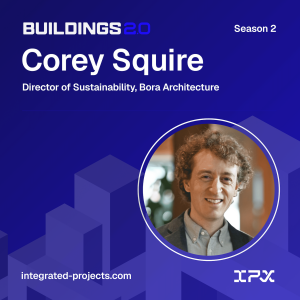
Monday Mar 03, 2025
Monday Mar 03, 2025
In this conversation, Corey Squire, Associate Principal and Sustainability Director at Bora Architecture, shares his journey into sustainable design, emphasizing the importance of metrics, human-centric approaches, and the role of policy in architecture. He discusses common misconceptions about sustainability, practical strategies for young designers, and the significance of renovation over new construction. The conversation also touches on the tools and technology used in design, the creation of spaces that promote happiness, and the future of sustainable architecture.
Takeaways
Sustainable design should focus on measurable impacts on building performance.
Sustainability is about creating healthy indoor environments for people.
Common misconceptions about sustainability often relate to cost.
Orientation and window placement are critical for energy efficiency.
Framed views in architecture enhance the user experience.
Renovating existing buildings can be more challenging but is essential.
Modern technology can significantly improve the performance of older buildings.
Sustainability metrics should be specific and relevant to the project goals.
The architecture industry is increasingly focusing on renovation projects. Over 50% of architecture revenue will come from existing buildings.
Decarbonization of buildings must happen at an unprecedented rate.
Renovation is often more complex than new construction due to policies.
Tools should enhance, not replace critical thinking in design.
Human happiness in spaces is driven by biological and environmental factors.
AI has limited effectiveness in generating meaningful architectural designs.
Best practices in design must be contextualized to specific communities.
The definition of good design is shifting towards community impact.
Future architecture will prioritize sustainability over aesthetics.
The architectural community is in a transitional period regarding design values.
Listen to more episodes:
Apple
Spotify
YouTube
Website
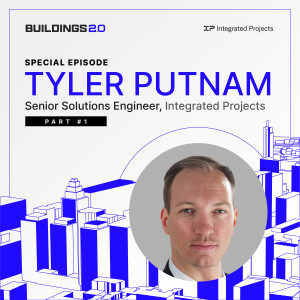
Thursday Jan 23, 2025
Thursday Jan 23, 2025
In this first installment of a two-part series on Buildings 2.0, Tyler Putnam, Senior Solutions Engineer at Integrated Projects, shares his innovative approach to merging architectural practice with technology and business innovation. Drawing from his equity-based design firm experience to pioneering BIM implementation at major architectural firms, Tyler discusses how digital transformation is reshaping traditional roles.
He also explores the evolution from CAD to BIM, emphasizing the importance of organizational change and business alignment. His insights on scan-to-BIM technology and digital twins show how data-driven approaches are revolutionizing building ownership and management, while his thoughts on procurement processes highlight opportunities for industry-wide improvement.
Topics discussed:
Revolutionizing architectural practice through equity-based design services, combining traditional design roles with innovative business models and construction integration.
The transformation from CAD to BIM workflows, in particular organizational change management and business alignment for successful implementation.
How scan-to-BIM technology serves different stakeholders, from architects and engineers to owners, creating a unified source of truth
The future of digital twins and data-driven decision making in building ownership, moving beyond traditional documentation methods.
The evolution of procurement processes and the need for better project initiation workflows in the architecture industry.
The historical shift in architectural roles from master builders to coordinators, and exploring paths to reclaim essential agency in project delivery.
Leveraging technology automation and computational design to transform traditional architectural processes and improve project efficiency across stakeholders.
Listen to more episodes:
Apple
Spotify
YouTube
Website
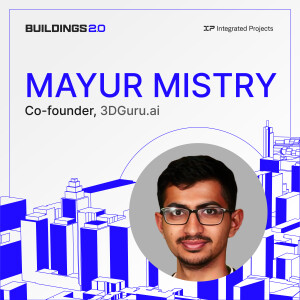
Thursday Jan 16, 2025
Thursday Jan 16, 2025
In this episode of Buildings 2.0, Jose speaks with Mayur Mistry, Co-founder, 3DGuru.ai and 3DGuru MVP Labs. Through his organizations, Mayur is democratizing AI tools for architecture and construction firms. He shares eye-opening insights about how the technology landscape has evolved, from needing 5,000 images to train an AI model in 2019, to now requiring just 5 images and a few dollars. Through his consulting work, he's also tackling a crucial challenge: helping medium-sized firms innovate without the hefty budgets typically needed for internal tool development.
Mayur explores practical frameworks for AI adoption, the importance of specialized data in beating bigger competitors, and why firms need to think strategically about their data today to stay ahead tomorrow. Mayur also shares valuable insights about different AI models (Claude vs. OpenAI vs. Llama) and how firms can choose the right tools for their specific needs.
Topics discussed:
How AI tools have become radically accessible going from requiring 5,000 images and specialized knowledge in 2019 to now needing just 5 images and the cost of a coffee.
Strategic approaches for firms to adopt AI: starting with pilot projects, focusing on immediate ROI, and leveraging no-code/low-code solutions for quick implementation.
Why firms need a robust data strategy today, including organizing unstructured data, leveraging specialized knowledge, and preparing for future AI implementation.
AI model selection, such as when to use Claude for coding tasks, OpenAI for general applications, and Llama for data-sensitive operations within firms.
Bootstrapping lessons learned on why starting with service-based consulting helped validate market needs and generate immediate revenue while building the product.
Breaking down AI agents, including how natural language can now orchestrate complex workflows, from real estate prospecting to automated design tasks in architecture.


